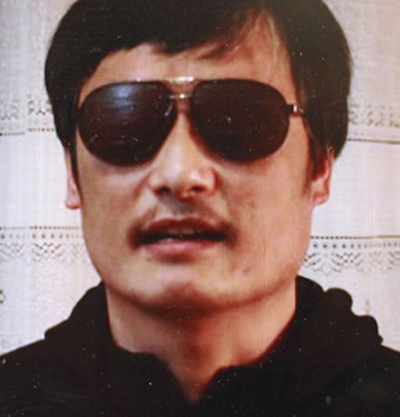
WASHINGTON (BP) — The case of Chinese human rights advocate Chen Guangcheng, who recently escaped house arrest, presents a “pivotal test for freedom in China and for U.S. credibility as a defender of freedom,” Bob Fu of the China Aid Association said.
[QUOTE@left@180=‘I always wish U.S. politicians would try to inspire the persecuted instead of sparing the feelings of the persecutors.’ — Bob Fu]President Obama and Secretary of State Hillary Clinton have been careful not to speak in clear support of Chen, who climbed over the back wall of his home April 22 and reportedly sought refuge with the U.S. Embassy in Beijing.
Chen, a 40-year-old self-trained lawyer who has been blind since childhood, was imprisoned and then placed under house arrest for exposing forced abortions under China’s one-child policy. In one of the most tragic examples Chen had helped uncover, the government forced a woman who was seven months pregnant to have an abortion, and then forcibly sterilized her, LifeNews.com reported.
“We recognize that President Obama and Secretary Clinton are in a delicate situation and the wrong word may cause problems,” Fu said in a statement April 30. “Our first priority is to protect Chen and his family, but it would be inspiring to hear an unqualified and spirited defense of freedom instead of dry diplomatic calculation.”
Obama “sidestepped” a question about Chen Monday, ABC News said, refusing to confirm reports that the United States is protecting him.
“I’m aware of the press reports of the situation in China, but I’m not going to make a statement on the issue,” Obama said. “What I would like to emphasize is that every time we meet with China, the issue of human rights comes up.
“It is our belief that not only is that the right thing to do because it comports with our principles and our belief in human rights, but also because we actually think China will be stronger as it opens up and liberalizes its own system,” the president said.
In an opinion piece published by The Washington Post April 29, Fu wrote that Chen’s escape had been planned carefully for many months and that he was “awed by the courage” of those who helped Chen escape nearly six years of torture, malnutrition and isolation.
Fu was among the first to know of Chen’s escape.
“The first thing he told me after escaping was that he wanted the outside world to know that he was not going to leave China but to ‘fight to the end for the freedom of my family… I want to live a normal life as a Chinese citizen with my family,'” Fu recounted.
When Chinese authorities realized four days after his escape that he was gone, they arrested his older brother and his nephew, Fu wrote, and Chen’s mother, wife and 6-year-old daughter are being tightly guarded by Chinese security forces.
“This is a pivotal moment for U.S. human rights diplomacy,” Fu wrote. “The United States must stand firm with this broadly popular individual or risk losing credibility as a defender of freedom and the rule of law.”
Clinton, who traveled to China Monday for economic talks, was asked about Chen before she left.
“A constructive relationship includes talking very frankly about those areas where we do not agree, including human rights,” Clinton told a reporter. “That is the spirit that is guiding me as I take off for Beijing tonight, and I can certainly guarantee that we will be discussing every matter, including human rights, that is pending between us.”
When pressed about Chinese activists who have gone missing over the years, Clinton replied, “I have nothing to add to what I’ve said at this time. I have a full agenda of many issues of great concern to us, including human rights and the freedom and free movement of people inside China who have a right to exercise those freedoms under the Universal Declaration of Human Rights.”
Fu, of the Texas-based China Aid Association, said, “I always wish U.S. politicians would try to inspire the persecuted instead of sparing the feelings of the persecutors. We hope that Secretary Clinton will speak as boldly as she has in many other instances before and let Beijing know that Chen Guangcheng’s aspirations for China’s future are shared by the U.S. and most of the free world.”
Fu quoted Obama’s inaugural address, in which the president said, “To those who cling to power through corruption and deceit and the silencing of dissent, know that you are on the wrong side of history but that we will extend a hand if you are willing to unclench your fist.”
Fu called on the Obama administration to “help the dictators of Beijing unclench their fist” by securing the safety of Chen and his family.
“China will move toward the ‘right side of history’ only when it recognizes that people like Chen are its strength, not its enemy,” Fu wrote.
In an article April 30, The Washington Post referred to China experts who say political asylum in the United States seems a likely outcome for Chen, despite his expressed desire to remain in China.
“It’s a difficult choice for Chen. Chinese dissidents who have gone into exile in the United States have gained freedom, but most have lost stature,” The Post said.
The newspaper highlighted several cases in which Chinese citizens have found refuge in the United States but in turn have given up the influence they had in China. Also, when dissidents go into exile, their relatives remain in danger, The Post said.
–30–
Compiled by Erin Roach, assistant editor of Baptist Press. Get Baptist Press headlines and breaking news on Twitter (@BaptistPress), Facebook (Facebook.com/BaptistPress) and in your email (baptistpress.com/SubscribeBP.asp).

















